“To get official information, you have to present yourself as someone other than a journalist.” New realities and challenges for independent media
A new reality confronted the Belarusian media in exile. Have journalistic standards changed? These and many other questions were discussed at the conference “Belarusian Mass Media. Content Quality and Issues of Self-Regulation”, organized by the Belarusian Association of Journalists.
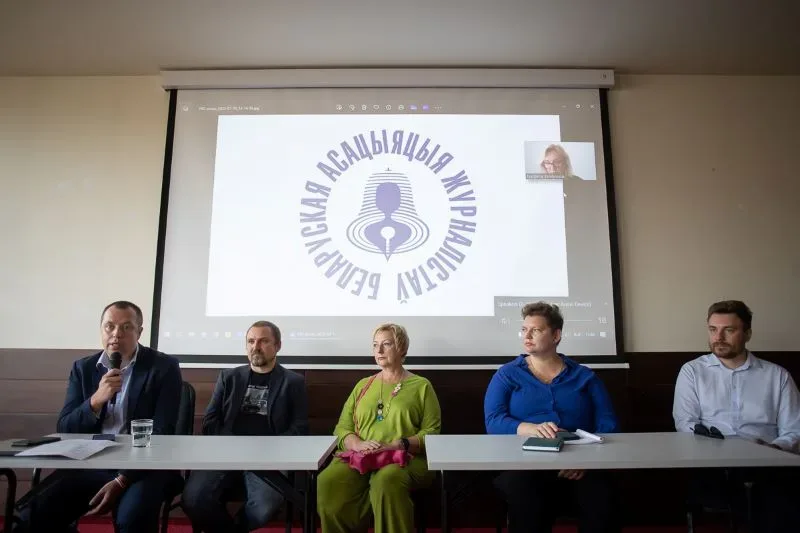
The Belarusian Mass Media. Content Quality and Issues of Self-Regulation Conference. September 10, 2024. Photo credit: BAJ
Independent media lost advertising markets in Belarus after their forced mass emigration. Donor funding is how most newsrooms operate. The free press has limited human and technological resources, as well as lacks up-to-date photos sourced from Belarus. All the problems are compounded by the activities of fakers and provocateurs, who add to the difficulties faced by independent media outlets.
What is more, Belarusian journalists are afraid to use their real names. Even experts are staying anonymous because they are worried about potential repression against their relatives back home in Belarus.
Despite difficult working conditions, how do independent media maintain the quality of their media products? This was discussed at a themed conference held on September 10 in Vilnius.
“Independent media has not slipped into barricaded journalism”
Nadzeya Belakhvostsik, editor-in-chief of the MediaIQ project, spoke about the daily challenges faced by the exiled independent press. The web portal documents and tracks the main trends of the Belarusian media. What did the experts conclude?
The editor pointed out that the resource documented the shift of the independent media to anonymity as early as 2021. The anonymity of authors and experts is supposed to reduce the credibility of independent media. However, this is not happening.
“We’ve built up a lot of trust over the past 30 years of working in Belarus, so the quality of free media content has not suffered as a result of anonymity,” says Nadzeya Belakhvostsik.
Another extremely serious problem is obtaining information from sources in Belarus.
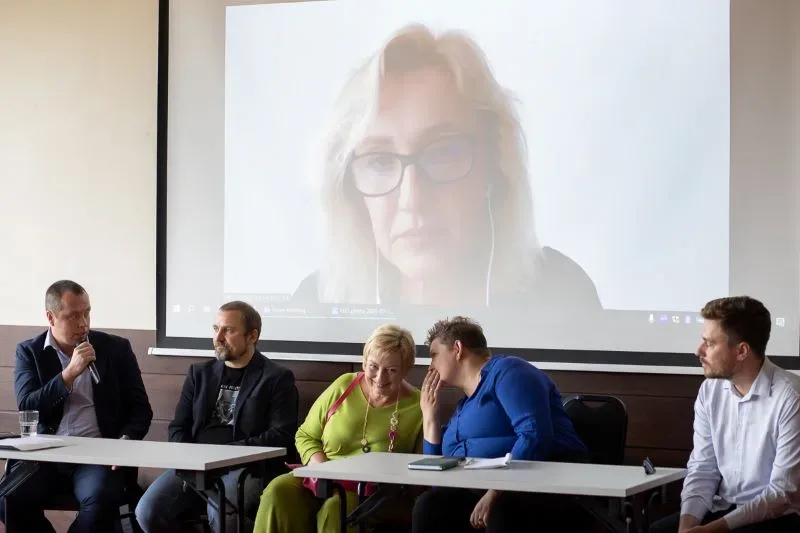
The Belarusian Mass Media. Content Quality and Issues of Self-Regulation Conference. September 10, 2024. Photo credit: BAJ
“It’s pretty common to see this happen: To get official information, you have to present yourself as someone other than a journalist. You can pass as a citizen, a foreign visitor, or do whatever makes an official provide information. Sure, this is a bit of an unorthodox approach to journalism, but it’s the only way to get any commentary at all.”
A big challenge is to verify the sources of information. All journalists should be doing fact-checking on a daily basis.
Nadzeya Belakhvostsik also brought up another topic, compliance with completeness standards. It is pretty common for authors to not include context for certain events.
“We have multiple monitoring specialists on our team. They have reported at times that the news feeds of state and independent media are basically the same. For example, when it comes to trial reports. The background of the case is not provided, and the publication may not indicate that the persecution is politically motivated. We expect our readers to know everything. But this is not the case, especially when we are addressing a neutral audience,” says Nadzeya Belakhvostsik. “Or when it comes to so-called ‘extremism.’ What the media often fails to emphasize is that there is in fact no extremism at all in the ‘extremism’ that is attributed to the independent media. The regime is trying to impose its vocabulary on the independent media, while the number of ‘extremists’ runs into the thousands. And thus the concept of ‘extremism’ is legitimized by the independent media.”
Independent media should always remind audiences of the context in which events unfold, according to MediaQ’s editor-in-chief:
“A whole new generation has grown up. For them, 2020 is becoming a myth from the past. With the complete cleansing of the information space, it is becoming increasingly difficult to find information about 2020, and the media isn’t providing much clarity on what ‘extremism’ actually entails. This is leaving many young people in the dark about the current situation. What will it look like in a year, five years, 10 years?” the editor asks rhetorically.
However, Nadzeya Belakhvostsik says that “most media outlets stuck to the standards they had before 2020 and didn’t turn into barricade journalism, which was a concern. The problems that are in place are what I would call challenges. They lead to an objective violation of some standards. We fix them, but we understand what causes them.”
On CyberPartisans aid and editorial dictatorship
Aliaksandr Yarashevich, co-founder of the media outlet Buro, reflected on how the media manages to maintain the quality of content.
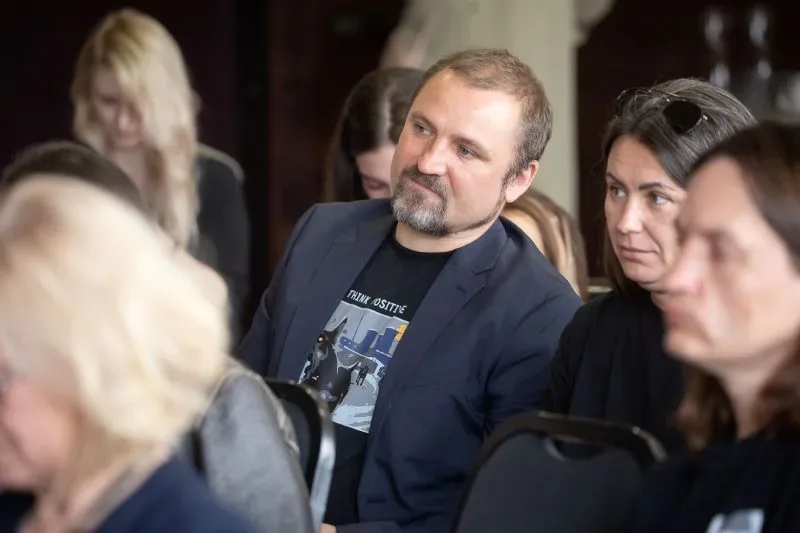
Aliaksandr Yarashevich at the Belarusian Mass Media. Content Quality and Issues of Self-Regulation Conference. September 10, 2024. Photo credit: BAJ
Buro is not a daily publication, which allows them more flexibility in how they handle investigations. They typically publish one such piece of content per month, which allows sufficient time for verification of the information presented. Concurrently, the editorial policy of the staff draws upon the experience of Belarusian mass media and that of international organizations.
“This standard is not much different from that used by other Belarusian journalists. We give those we ask to comment the right to respond. Because the story can change face completely,” explains Yarashevich.
The state withholds information from journalists. But there are the CyberPartisans, a group of hackers who have hacked into various state government databases. Who can be “investigated” and who cannot is a moral and legal question.
Aliaksandr Yarashevich notes that CyberPartisans can be used to solve cases of great public importance: bribery of officials, evasion of sanctions, and similar instances. The journalist also said that even when they get some info from CyberPartisans, they will not be publishing it until they can confirm it’s true.
Iryna Novik, who handles special projects at Hrodna.life, says that smaller media outlets “can’t win the sprint race.”
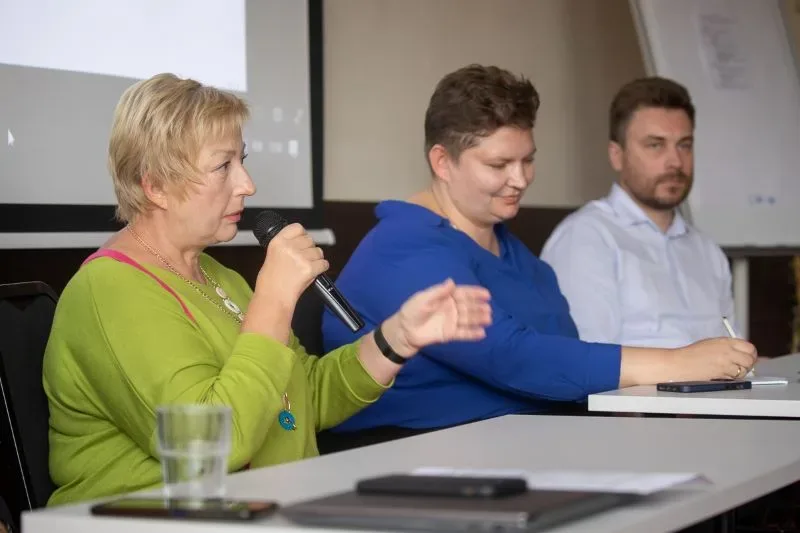
Iryna Novik at the Belarusian Mass Media. Content Quality and Issues of Self-Regulation Conference. September 10, 2024. Photo credit: BAJ
“Algorithmization, peer review, and support are three more standards to add to the list,” says Novik.
She believes that the biggest issue at the moment is the people.
“We are anonymous, our subjects are anonymous, the country is anonymous. So when a journalist gets a name that can be verified by reliable sources, it is tempting to publish it. But sometimes you release a name, it goes by once or twice, and then we stop using it. That is to say, we adhere to the standards to a certain extent, but the extraordinary working conditions force us to look for individual, personal solutions to navigate between Scylla and Charybdis in every situation,” says the editor.
Andrei Shauluha talked about the standards RFE/RL Belarus adheres to.
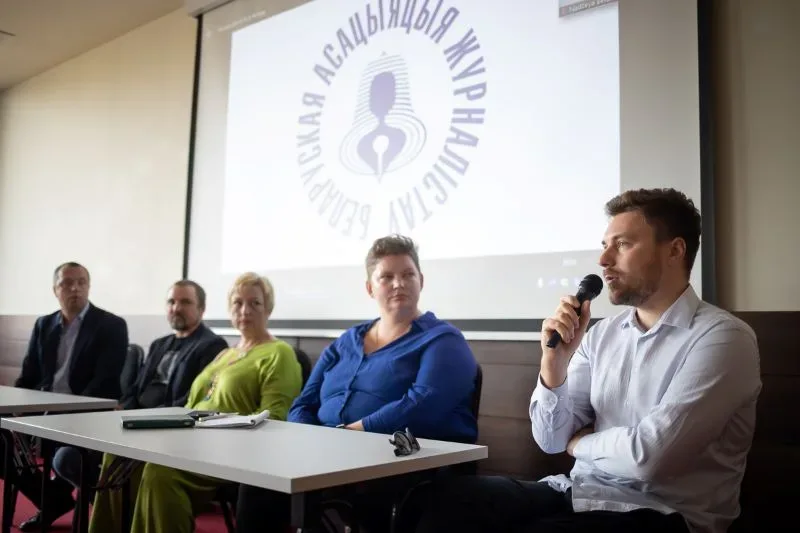
Andrei Shauluha at the Belarusian Mass Media. Content Quality and Issues of Self-Regulation Conference. September 10, 2024. Photo credit: BAJ
“The rules are pretty straightforward. Sometimes it’s better to be late with a news story, but you’ve always got to stick to the two-source rule (verifying information from at least two independent sources).”
As working conditions get worse, it is easier to cut corners and lower standards.
“We can’t afford such indulgences. We can always just call our subject. Even if they don’t answer, we can still refer to the lack of response.”
The current and future challenges of Belarusian journalism
Maryia Sadouskaya-Komlach, representative of the Free Press for Eastern Europe, spoke about current and immediate challenges:
“When I talk to leading Polish media, they say clicks and views are the most important thing they have to show to their managers, advertisers, and investors as commercial entities. The editor-in-chief of a Polish news portal said that he’d now be ‘trimming the fat’ from his portal. He finally got the green light from the strategy team to put the audience first.
It’s not about your writing standards, it’s about putting your reader’s interests first. And if you get your readers used to better content, that can help in the future.”
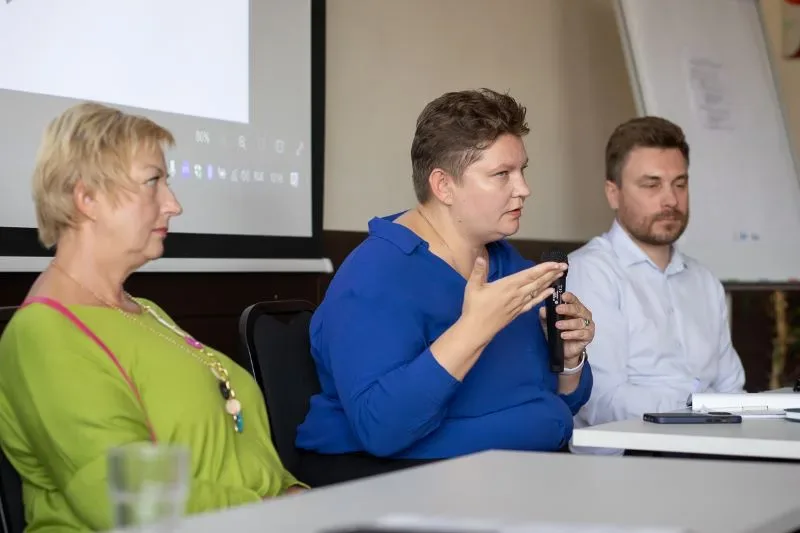
Maryia Sadouskaya-Komlach at the Belarusian Mass Media. Content Quality and Issues of Self-Regulation Conference. September 10, 2024. Photo credit: BAJ
Maryia Sadouskaya-Komlach characterizes the quality of the Belarusian media as “being in the borderland.” This term describes the media’s status as part of the global media landscape, situated within the legal and regulatory frameworks of the European Union.
“Interviews with representatives of exiled media outlets revealed that 90% of financial support for their operations is derived from donors. On the one hand, it is not commerce-related money. It appears that there is an opportunity to pursue journalism for its own sake, without regard for commercial considerations. It is, however, a fact of life that taxpayer money is managed by investors who are represented by states, officials, or donors. In turn, taxpayers inquire of their governments how their money is being spent. Regrettably, there is no consensus on which indicators to adopt as quality criteria. Very often the primary measure is quantity.”
But as soon as Belarusian mass media are labeled “extremist,” all these indicators make no sense. The media can still do quality journalism, but you have to show that you are worthy to your readers, colleagues, and the international community.
“Unless we, as a sector, start thinking about how we can collectively move beyond our current constraints (which are negatively impacting the quality of our journalism), we will not take a step forward in our development. The editor of the aforementioned Polish portal mentioned that one of their journalists received an environmental scholarship in Oxford, where he spent six months. I asked him: ‘How so, are you going to pay more attention to the environmental issues now?’ And he replied: ‘You don’t understand, we have become hostages of our field.’”
 @bajmedia
@bajmedia
